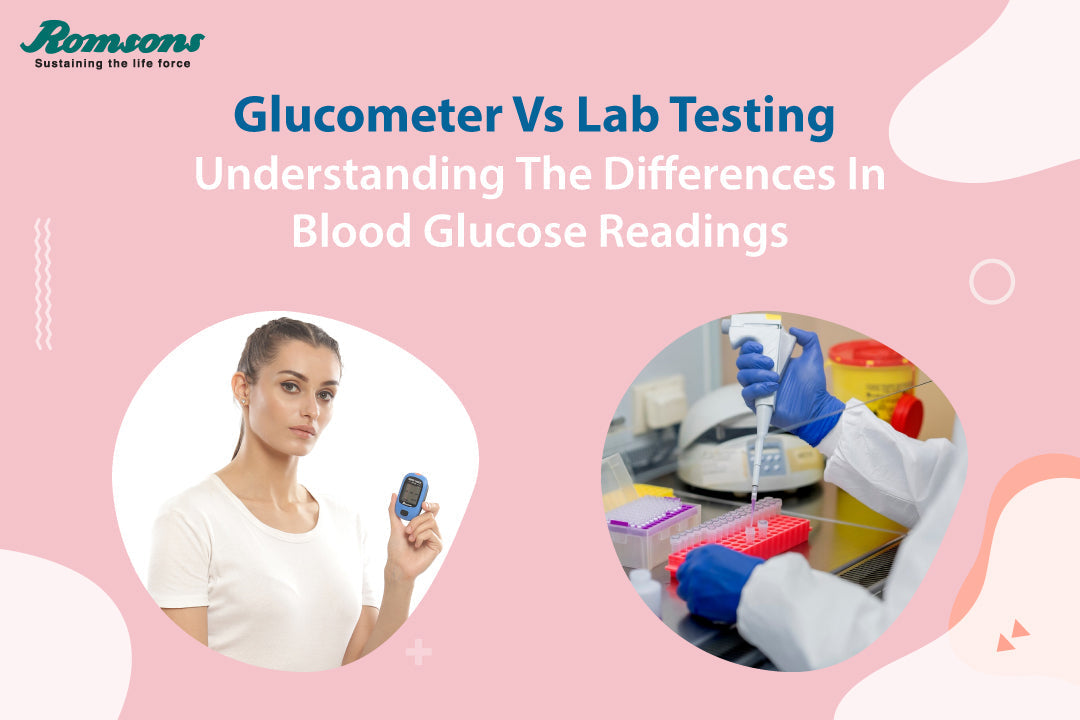Glucometer Vs Lab Test: Understanding The Differences In Blood Glucose Readings

Managing diabetes requires consistent monitoring and informed decision-making. For millions of people worldwide, two primary methods help track blood glucose levels — glucometers and lab tests.
While both measure blood sugar, they differ significantly in accuracy, cost, frequency, and purpose. Understanding these differences helps you choose the right method for effective diabetes control.
What is a Glucometer?
A glucometer is a small, portable device that allows individuals — especially those with diabetes — to check their blood glucose levels at home.
It works by analyzing a tiny drop of blood, usually from a fingertip, to provide near-instant results. Glucometers are invaluable for daily monitoring, allowing users to adjust medications, diet, and activity levels as needed.
Benefits of Using a Glucometer
- Convenience: Provides instant results anytime, anywhere.
- Frequent Testing: Enables multiple checks per day for tighter glucose control.
- Cost-Effective: More affordable than lab tests with minimal recurring expenses.
- Real-Time Insights: Allows immediate action for insulin adjustments or dietary changes.
Limitations of Glucometers
- Accuracy Variations: Results may vary due to test strip quality, meter calibration, or external factors.
- Snapshot Reading: Reflects glucose levels only at the time of testing, not long-term trends.
What is a Lab Glucose Test?
A laboratory glucose test is performed under professional medical supervision to measure blood sugar levels with high precision.
Common types of lab tests include:
- Fasting Blood Sugar (FBS): Measures glucose after overnight fasting.
- Oral Glucose Tolerance Test (OGTT): Evaluates how your body processes glucose after consuming a sugary solution.
- HbA1c Test: Shows the average blood sugar levels over the past 2–3 months.
- Random Blood Sugar Test: Taken anytime, regardless of meals.
Advantages of Lab Tests
- High Accuracy: Conducted in controlled environments by professionals.
- Comprehensive Insights: Tests like HbA1c offer long-term glucose trends.
- Medical Oversight: Doctors use results to modify treatment plans accurately.
- Quality Assurance: Laboratories follow strict testing standards.
Limitations of Lab Tests
- Time Delay: Results take hours or days to receive.
- Higher Costs: More expensive and may not be covered by all insurance plans.
-
Less Frequent Monitoring: Not suitable for daily tracking or immediate adjustments.
Glucometer vs Lab Test: Key Differences
|
Parameter |
Glucometer |
Lab Test |
|
Accuracy |
Moderate; can be affected by external factors |
Highly accurate under controlled conditions |
|
Convenience |
Portable and easy to use |
Requires clinic visit and blood sample collection |
|
Cost |
Cost-effective for daily use |
More expensive per test |
|
Frequency |
Multiple times a day |
Periodic (monthly or quarterly) |
|
Data Insights |
Instant reading |
Long-term glucose control trends (HbA1c) |
In short, glucometers are ideal for daily self-monitoring, while lab tests offer a comprehensive and accurate medical evaluation.
When to Use Each Method
Use a Glucometer When:
- You need real-time glucose readings for medication or diet adjustments.
- You prefer home monitoring for daily diabetes management.
- You want to track daily fluctuations in blood sugar levels.
Use Lab Tests When:
- Your doctor recommends a periodic assessment of overall glucose control.
- You need precise results for treatment evaluation.
- You’re undergoing a medical check-up or diagnostic evaluation.
- Finding the Balance
Both methods are essential in diabetes care.
- Glucometers empower patients with real-time control and flexibility.
- Lab tests ensure accuracy and help healthcare providers make informed decisions.
Combining both — frequent self-monitoring with periodic lab testing — is the most effective way to maintain stable blood glucose levels.
Romo Check Plus Blood Glucometer: Smart Diabetes Monitoring Made Simple
In today’s fast-paced life, accuracy and convenience in diabetes management are crucial. The Romo Check Plus Blood Glucometer from Romsons bridges the gap between technology and trust.
Key Features:
- Accurate and Reliable Results: Designed with advanced sensor technology.
- 100 Memory Storage: Helps track glucose trends over time.
- Quick Results: Instant readings within seconds.
- User-Friendly Design: Easy to handle, portable, and compact.
- Long Battery Life: Ensures uninterrupted monitoring on the go
The Romo Check Plus makes it easier to monitor, record, and manage your blood sugar levels effectively — a must-have for anyone looking to stay in control of diabetes.
To know more about Romsons Health Care Products, click here.
Both glucometers and lab tests play vital roles in diabetes management.
- Glucometers offer immediate insights for daily decisions.
- Lab tests provide accurate, long-term analysis for medical evaluation.
By understanding the differences, and with reliable tools like the Romo Check Plus Blood Glucometer, you can manage your diabetes confidently and live a healthier, more balanced life.

